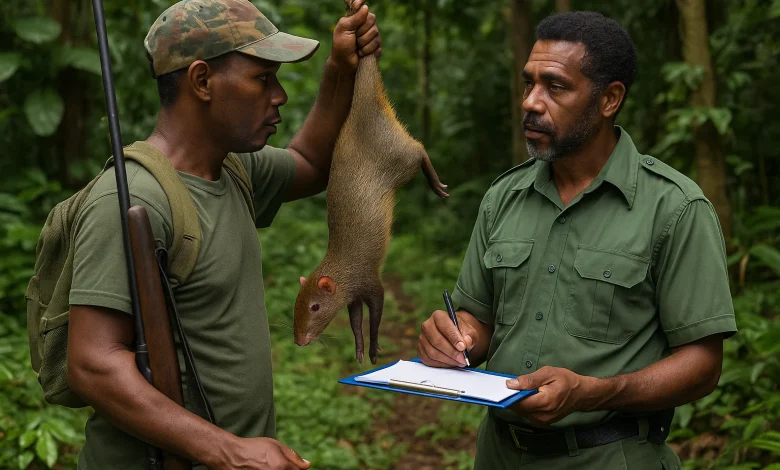Hunting in Dominica

Hunting in Dominica is regulated to protect wildlife, maintain sustainable harvests, and keep endangered species safe. The legal basis sits in the Forestry and Wildlife Act, which defines protected and specially protected species, requires hunting licences, and empowers officers to enforce seasons, gear limits, and closed areas. National parks are ruled under the National Parks and Protected Areas Act, which adds site-specific protections.
Legal framework and Open Seasons
The Forestry and Wildlife Act classifies mammals, birds, and crustaceans as protected, specially protected, or open to controlled take. It also sets licence requirements and recognises that children may hunt only under adult supervision. Hunting in any national park is prohibited. Offences can be prosecuted before the Magistrate’s Court.
Hunting is permitted only during declared open seasons and only by persons holding a valid hunting licence. In recent years the Forestry, Wildlife and Parks Division has announced limited open seasons toward the end of the calendar year. For example, authorities temporarily lifted the ban from 27 September to 31 December 2024 for licensed hunters, and specified an Oct–Nov window in 2023. These announcements commonly list the species that may be taken and remind hunters to observe bag discipline.
When an open season is declared, it usually covers a short list that has included: Agouti, Manicou (opossum), and Crabs in designated areas and methods.
Not every year is the same. Check the current notice before going out, since species lists and dates can change with rainfall, habitat condition, or monitoring results. In 2024 authorities again limited the list to agouti, manicou, and crabs for licensed hunters. Forestry officers regularly urge restraint to keep game populations healthy.
Protected Wildlife & Prohibited Places
Dominica’s two endemic parrots are strictly off limits at all times. The Act names the Imperial Amazon (Amazona imperialis, Sisserou) and the Red-necked Amazon (Amazona arausiaca, Jaco) as specially protected birds. Independent conservation sources confirm their protected status and ongoing recovery work. Other protected categories include listed birds, mammals, and crustaceans that cannot be hunted outside very specific regulatory allowances.
Hunting is barred in national parks and other declared protected areas. The law also restricts destructive practices such as explosives, poisons, or night lighting where these would give unfair advantage or cause unnecessary harm. These controls are designed to protect nesting sites, roosts, and sensitive habitats.
Species and Beaches
Dominica is home to the native Lesser Antillean iguana (Iguana delicatissima), listed as Critically Endangered regionally. The arrival of the non-native green iguana threatens the native through competition and hybridisation. Regional documents note Dominica’s programme to capture non-native iguanas and evaluate differences to safeguard the native species. Hunters should not target the native iguana and should follow official guidance if they encounter non-natives during other lawful activities.
Beach and marine wildlife protections operate alongside hunting rules. Sea turtles and their nests are protected by wildlife and parks legislation with closed seasons and beach lighting guidance. These duties complement coastal controls under the Beach Control Act and reinforce the island’s wider marine conservation approach.
Enforcement, Safety and Seasons
Authorised officers may inspect licences and game, seize prohibited gear, and bring charges for out-of-season take, possession of protected species, or hunting in closed areas. Penalties can include fines, forfeiture, and licence suspension.
Hunters are expected to practise safe handling, respect private land, avoid sensitive habitats, and take only what their household can use. Forestry and Parks messages repeatedly encourage moderation, especially for agouti and manicou, to keep populations stable for future seasons.
Recent announcements illustrate how seasons are managed in practice:
- 2023: temporary lifting of the ban from 1 October through 30 November; emphasis on restraint and legal species only.
- 2024: temporary lifting from 27 September through 31 December for licensed hunters, limited to agouti, manicou, and crabs.
Because open seasons are declared annually, always rely on the current Forestry Division notice.
How Hunting fits into Conservation
Hunting policy is tied to habitat condition, rainfall, and monitoring of game species. Short, licence-controlled seasons focus effort, reduce pressure during breeding periods, and align with broader biodiversity goals such as parrot recovery and turtle protection. Invasive species management, particularly control of non-native iguanas, supports native fauna. As a result, regulated hunting can coexist with ecosystem protection when bag discipline and legal methods are respected.
Practical checklist for hunters
- Purchase and carry a valid hunting licence for the current season.
- Confirm the official open season dates and permitted species each year.
- Do not hunt in national parks or other closed areas.
- Never target parrots or other protected wildlife.
- Avoid destructive methods and respect private property.
- Report poaching, illegal gear, or suspicious activity to Forestry and Parks.




